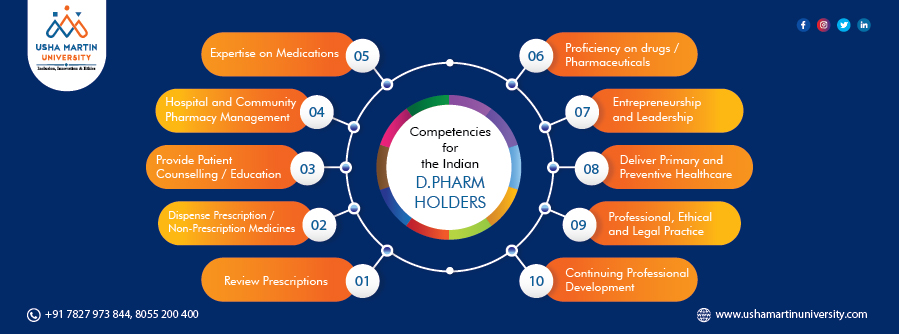
Top Five Career Opportunities for Pharmacy Graduates in COVID-19 Era
October 8, 2021
MBA with Dual Specialization vs Single Specialization:Which is the Smarter Choice?
November 19, 2021Competency is defined as “A distinct composite of knowledge, skill, attitude and value that is essential to the practice of the profession in real life contexts”.
The candidates who successfully complete the D. Pharma Diploma in Pharmacy program, from the institutions approved by the Pharmacy Council of India are expected to attain the following professional competencies.
10 Professional Competencies for the Indian D. Pharm Holders:
- Review Prescriptions.
- Dispense Prescription / Non-Prescription Medicines.
- Provide Patient Counselling / Education.
- Hospital and Community Pharmacy Management.
- Expertise on Medications.
- Proficiency on drugs / pharmaceuticals.
- Entrepreneurship and Leadership.
- Deliver Primary and Preventive Healthcare.
- Professional, Ethical and Legal Practice.
- Continuing Professional Development.
Review Prescriptions: The student should receive and handle prescriptions in a professional manner and be able to check for their completeness and correctness.
Dispense Prescription / Non-Prescription Medicines: The student should be able to dispense the various scheduled drugs / medicines as per the implications of the Drug & Cosmetics Act and Rules thereunder. Also, the non-prescription medicines (over-the-counter drugs) should be dispensed judicially to the patients as required.
Provide Patient Counselling / Education: The student should be able to effectively counsel / educate the patients / caretakers about the prescription / non-prescription medicines and other health related issues. Effective communication includes using both oral and written communication skills and various communication techniques.
Hospital and Community Pharmacy Management: The student should be able to manage the drug distribution system as per the policies and guidelines of the hospital pharmacy, good community pharmacy practice and the recommendations of regulatory agencies. Also, be able to manage the procurement, inventory, and distribution of medicines in hospital / community pharmacy settings.
Expertise on Medications: The student should be able to provide an expert opinion on medications to health care professionals on safe and effective medication-use, relevant policies and procedures based on available evidences.
Proficiency on Pharmaceutical Formulations: The student should be able to describe the chemistry, characteristics, types, merits and demerits of both drugs and excipients used in pharmaceutical formulations based on her/his knowledge and scientific resources.
Entrepreneurship and Leadership: The student should be able to acquire the entrepreneurial skills in the dynamic professional environments. Also, be able to achieve leadership skills through teamwork and sound decision- making skills.
Deliver Primary and Preventive Healthcare: The student should be able to contribute to various healthcare programs of the nation including disease prevention initiatives to improve public health. Also contribute to the promotion of national health policies.
Professional, Ethical and Legal Practice: The student should be able to deliver professional services in accordance with legal, ethical, and professional guidelines with integrity.
Continuing Professional Development: The student should be able to recognize the gaps in the knowledge and skills in the effective delivery of professional services from time to time and be self-motivated to bridge such gaps by attending continuing professional development programs.





